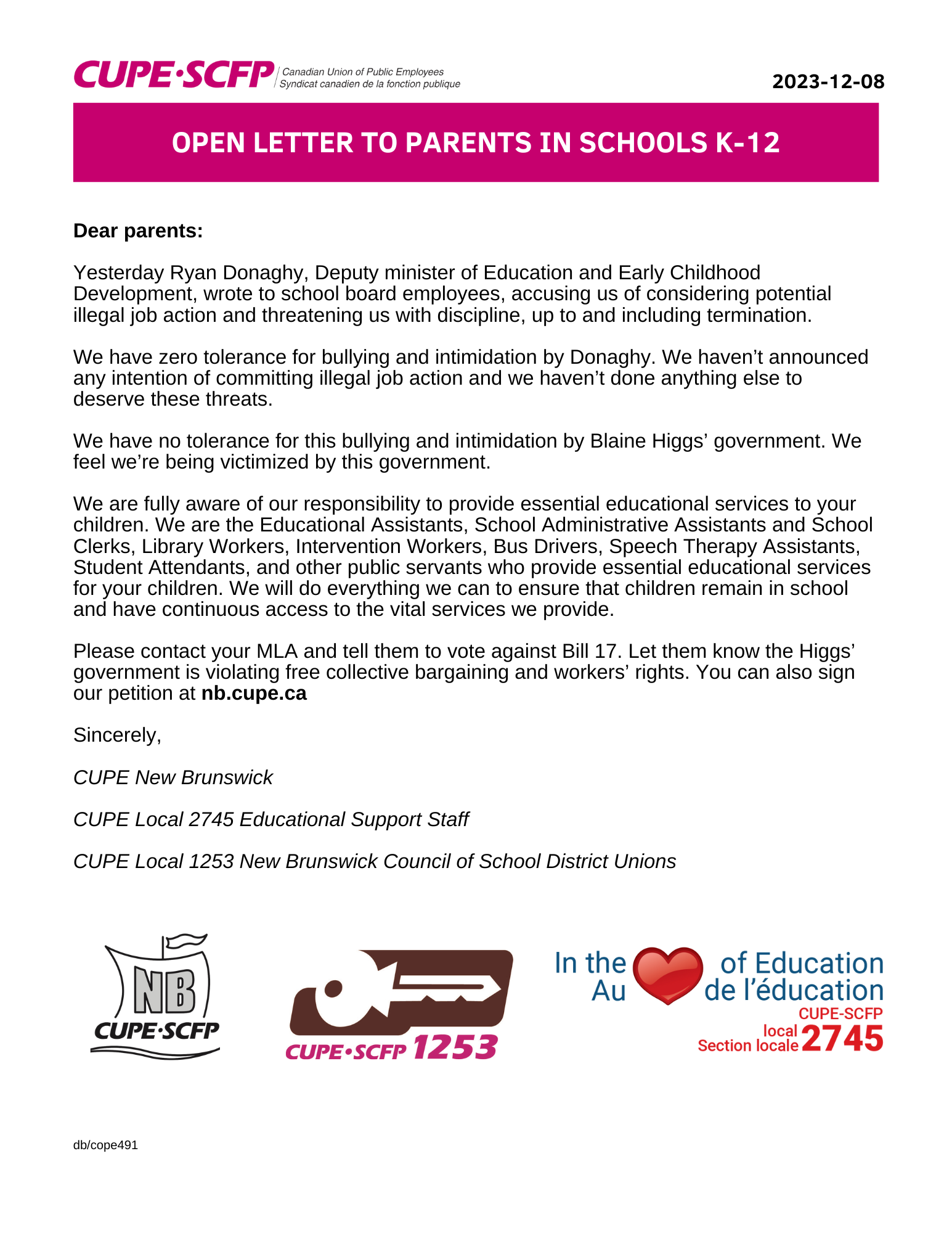 Loading...
Loading...

Below is the link for 3 webinars on Pensions, Collective Bargaining, and Bill 17. These webinars are open to all members.
Voici ci dessous le lien vers 3 webinaires sur les pensions, les négociations collectives et le projet de loi 17.
Ces webinaires sont ouverts à tous les membres.
Dec 8, 2023 05:00 PM
Dec 9, 2023 10:00 AM
Dec 9, 2023 05:00 PM
https://ca01web.zoom.us/j/62257529391?pwd=VmFaUmhZYk5WOTkyT1k5c0wyZnBEQT09
Passcode: 926942
Or One tap mobile :
+17806660144,,62257529391#,,,,*926942# Canada
+12042727920,,62257529391#,,,,*926942# Canada
Or Telephone:
Dial(for higher quality, dial a number based on your current location):
+1 780 666 0144 Canada
+1 204 272 7920 Canada
+1 438 809 7799 Canada
+1 587 328 1099 Canada
+1 647 374 4685 Canada
+1 647 558 0588 Canada
+1 778 907 2071 Canada
Webinar ID: 622 5752 9391
Passcode: 926942
Legislature Tuesday – update to members on Bill 17 and our most recent “fact or fiction” document.


Download the factsheet sent to all MLAs in NB :
 Loading...
Loading...
Update on Bill 17 – the attack on our right to free collective bargaining. Below you will find the memo and the list of New Brunswick PC MLAs.


Fredericton, NB – CUPE Local 1253, which represents 2800 school district bus drivers, custodians and trade workers, along with CUPE Local 2745, representing 4400 educational support staff, held a press conference today to denounce the provincial government’s threats to free collective bargaining.
Last week, the provincial government delivered a message to the two education locals, signaling the provinces’ intent to breach the contract that concluded the 2021 public sector strike. They issued an ultimatum to the locals: abandon the hard-fought agreement on pensions established in November 2021 and March 2022, or face the imposition of a new pension plan through legislation this week.
In response to this unwarranted threat, CUPE Locals 2745 and 1253 took a firm stand and sent a stern response to the government this Monday. “We will not negotiate under threat. We have a fair pension plan agreement in place for our members, and the government’s attempt to change the rules of the game is unacceptable,” said Theresa McAllister, President of CUPE 2745.
Iris Lloyd, President of CUPE 1253, added, “The introduction of a new law would constitute a breach of our collective agreement, a contract that Premier Higgs himself advocated for. It is a betrayal of the very process he championed.”
Approximately 20,000 New Brunswickers endured a 16-day strike, resulting in hardships for tens of thousands of families, all in pursuit of a fair agreement. The Premier and his Cabinet’s decision to disregard this hard-won compromise has broader implications for the entire province. CUPE sounds the alarm for all entities with contracts under the Higgs government — unions, communities, First Nations, businesses, etc. Theresa McAllister warned, “If the government can break its promise to us, what’s to stop them from breaking other promises? There must be consequences for reneging on agreements.”
“As New Brunswickers, we take promises seriously. Signed contracts, negotiated in good faith, are the foundation of modern labour relations,” said Iris Lloyd. “If the government tests this foundation, the ground will shake around them,” added Lloyd.
CUPE Locals 2745 and 1253 call on all MLAs to support and protect free collective bargaining. “It is crucial for the government to follow the established processes laid out in the signed contracts. Both locals assert their readiness to proceed with the agreed-upon steps, and the ball is now in the government’s court,” concluded McAllister.
CUPE Local 1783, representing municipal transit workers in Fredericton, denounces the City’s recent move to privatize Para-Transit services. Para-Transit is a public service funded and operated by the Transit Division of the City, which provides transportation for citizens with disabilities within the geographical limits of Fredericton.
“CUPE has been made aware that the City will contract out this service as of January 2024,” said CUPE Servicing Representative Ralph McBride. The employer conveyed this decision to the union, stating that the City had been actively working on this process since last spring. Todd English, President of Local 1783, expressed his disappointment: “They did not even discuss this with the workers until it was a done deal, and they were doing this during our bargaining negotiations, without bringing it to our attention,” said English.
Todd English noted: “The City’s initial intent was to enhance services for residents by introducing Sunday bus services, a proposal that the union membership readily supported and made possible through changes to our collective agreement. However, the City’s new decision to relinquish control of services for those with disabilities to an external company has left us baffled,” said English.
Mr. McBride emphasized, “What should concern taxpayers is that the City contracted out all the way to Western Canada. In my opinion, once the contract is signed, the City loses control over the service.” CUPE is also concerned about the quality of service for residents with disabilities. “Contracting out means residents have little to no say in operational hours, rate setting, or fees. These companies don’t take on these contracts without aiming for profit, and as long as they adhere to the terms of the agreement, the City will have no say,” added McBride.
This move by the City of Fredericton raises concerns as it contradicts the City’s promotion of itself as a place to live and support local businesses. “By outsourcing an already well-established public service to a private company from Western Canada with zero ties to the community, the City’s commitment to its residents is called into question,” said English.
CUPE Local 1783 urges all citizens and taxpayers of Fredericton to reach out to their local council representatives and request an immediate reversal of this decision.
CUPE Local 1783 represents more than 45 municipal transit workers in Fredericton.